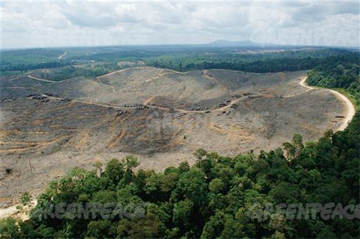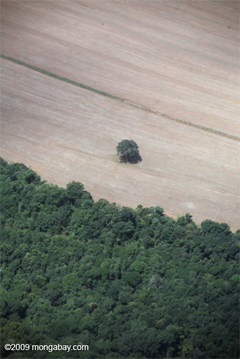|
(7/7/10) Greenpeace’s charges against Walmart have been called into question: Walmart fires back at Greenpeace over deforestation charges. |
Major U.S. companies are contributing to the destruction of Indonesia’s rainforests by sourcing paper from Asia Pulp and Paper (APP), a subsidiary of Indonesia-based conglomerate Sinar Mas, alleges a new report from Greenpeace.
Investigating two sites on the Indonesian island of Sumatra, the activist group documented destruction of rainforests and carbon-dense peatlands by APP, a company that has lost several major contacts in recent years due to its poor environmental record. The company has since launched a public relations-campaign and new brands in an attempt to win back business in Western markets. Nevertheless Greenpeace reports that Carrefour, Tesco, and Kraft are phasing out APP products, while “Kimberly-Clark, Nestle and Unilever are implementing new policies that will also rule out supplies from APP, unless the company and its suppliers make substantial changes.”
 Forest Destruction in Sinar Mas pulpwood concession, Bukit Tiga Puluh Landscape, Sumatra. Bukit Tigapuluh. Spanning over half a million hectares, the Bukit Tigapuluh Forest Landscape in Central Sumatra is one of the last refuges for the critically endangered Sumatran tiger. It has been designated one of the 20 highest global priority landscapes for conserving tigers. Of this landscape, 144,000 hectares are designated as the Bukit Tigapuluh National Park. Bukit Tigapuluh is the island’s largest lowland rainforest region, hosting incredible biodiversity: 660 plant species, 200 species of birds and 60 mammal species, including the highly endangered clouded leopard (Neofelic nebulosa), Malayan tapir (Tapirus indicus) and elephant (Elephas maximus). Date: 26 April 2010. Image and caption courtesy Greenpeace. |
Greenpeace called out Walmart, Auchan, and Kentucky Fried Chicken (KFC) as companies that continue to buy from APP despite its role in deforestation and peatlands degradation.
“This investigation shows how major international companies like Walmart and KFC are causing Indonesia’s peatland and forests to be slashed and burned for every day paper products,” said Bustar Maitar, Greenpeace Southeast Asia forest campaigner, in a statement. “Some of the world’s best known brands are pulping the planet.”
Maitar added that any company that buys from APP’s parent company Sinar Mas, which is also the world’s second largest supplier of palm oil, is complicit in the destruction of Indonesia’s rainforests, which support critically endangered species like Sumatran rhinos, Sumatran tigers, and Sumatran orangutans, as well as local people who depend on small-scale community forestry for their livelihoods.
 Forest clearing in Mato Grosso. Photo by Rhett A. Butler. A Greenpeace report in June 2009 linked major consumer brands to deforestation in the Amazon. Shortly thereafter Wal-Mart implemented new beef and leather sourcing policies in Brazil. |
“Sinar Mas is not only guilty of environmental abuses but is a repeat offender – its ‘sustainability commitments’ are not worth the paper they are written on. Greenpeace is calling on all companies like Walmart and KFC to stop doing business with Sinar Mas immediately,” said Maitar.
The report, titled ‘How Sinar Mas is Pulping the Planet’ [PDF] alleges that APP is draining peatlands deeper than 3 meters, a direct violation of Indonesian law.
Indonesia ranks as the world’s third largest greenhouse gas emitter primarily the result of carbon dioxide produced from forest fires and drainage of swampy peatlands. In May, Indonesian President Susilo Bambang Yudhoyono signed a $1 billion conservation deal with Norway to protect the southeast Asian nation’s remaining forests. The plan includes a two-year moratorium on new logging and plantation concessions on peatlands and primary forest lands starting next year. The initiative has been fiercely contested by the powerful forestry lobby.
|
(7/7/10) Greenpeace’s charges against Walmart have been called into question: Walmart fires back at Greenpeace over deforestation charges. |
Related articles

In Battle to Save Forests, Activists Target Corporations
(06/24/2010) The image of rainforests being torn down by giant bulldozers, felled by chainsaw-wielding loggers, and torched by large-scale developers has never been more fitting: Corporations have today replaced small-scale farmers as the prime drivers of deforestation, a shift that has critical implications for conservation. Yet while industrial actors exploit resources more efficiently and cause widespread environmental damage, they also are more sensitive to pressure from consumers and green groups. As a result, activists have more power today than ever to affect corporate behavior and slow the dizzying pace of tropical deforestation worldwide. That power has been on display in recent months, as campaigns by environmental groups have forced major corporations to stop doing business with companies accused of widespread deforestation.
Paper provider for fashion gurus drops APP due to deforestation across Indonesia
(12/02/2009) One by one, the fashion industry’s biggest companies are leaving Asian Pulp and Paper (APP)—and deforestation in Indonesia—behind. The newest defector is PAK 2000, a packaging company for fashion products. After a sustained campaign by the Rainforest Action Network (RAN) and fashion companies buying from PAK 2000, the New Hampshire-based company, has announced that it is severing all ties with APP by the end of the year. The announcement means that big famous companies—from Versace to J. Crew—will have an easier time avoiding paper products that cause rainforest destruction.
Gucci drops APP in pledge to save rainforests
(11/03/2009) One of the world’s largest and most prestigious fashion brands has stated it will stop sourcing paper from Indonesian forests and will drop Asia Pulp and Paper (APP) as a supplier, which has become notorious for tropical deforestation. The move comes after pressure from the Rainforest Action Network (RAN) on the fashion industry to stop sourcing paper from threatened rainforests for their shopping bags.
Burning by Asia Pulp & Paper contributes to haze in Indonesia, Malaysia
(07/28/2009) One quarter of fire hotspots recorded in the Indonesia province of Riau on the island of Sumatra in 2009 have occurred in concessions affiliated with Sinar Mas Group’s Asia Pulp & Paper (APP), according to new analysis by Eyes on the Forest, a coalition of environmental groups. The fires are contributing to the “haze” that is affecting air quality and causing health problems in Malaysia.
APP, Sinar Mas plan to log habitat of critically endangered orangutans

(05/20/2009) Asia Pulp & Paper and Sinar Mas Group have acquired a license to clear hundreds of hectares of unprotected rainforest near Bukit Tigapuluh National Park on the Indonesian island of Sumatra, report environmental groups who say the activity threatens a population of critically endangered orangutans that have been re-introduced into the wild. The companies intend to log the concession for timber and plant it for industrial timber and oil palm plantations.
Rash of tiger attacks linked to deforestation by large paper corporation APP

(03/18/2009) The Sumatran tiger, a critically-endangered subspecies, is hanging on by a thread in its island home. Biologists estimate that at most 500 individuals remain with some estimates dropping as low as 250. Despite the animal’s vulnerability, large-scale deforestation continues in its habitat mostly under the auspices of one of the world’s largest paper companies, Asian Pulp and Paper (APP). Shrinking habitat and human encroachment has led to a rise in tragic tiger encounters, causing both human and feline mortalities.
Woolworths drops contract with APP, activist group remains wary
(08/10/2008) Last week Woolworths announced it was dropping its contract with Asian Pulp and Paper (APP). Woolworths had come under considerable fire for carrying APP, which has a notorious record of environmental degradation on the Indonesian island of Sumatra. Previously APP has lost contracts with several other large companies including Office Depot, Wal-Mart, and Staples. APP has also fallen foul of several environmental groups like the World Wildlife Fund, the Rainforest Alliance, and the Forest Stewardship Council, which certifies sustainable wood products.
WSJ inquiry pushes FSC to cancel logging certification in endangered forest
(10/30/2007) An inquiry by The Wall Street Journal prompted the Forest Stewardship Council (FSC), an environmental body that runs a widely accepted “green” labeling system for forestry products, to revoke certification for a Singapore-based Asia Pulp & Paper Co. (APP) project on the Indonesian island of Sumatra.